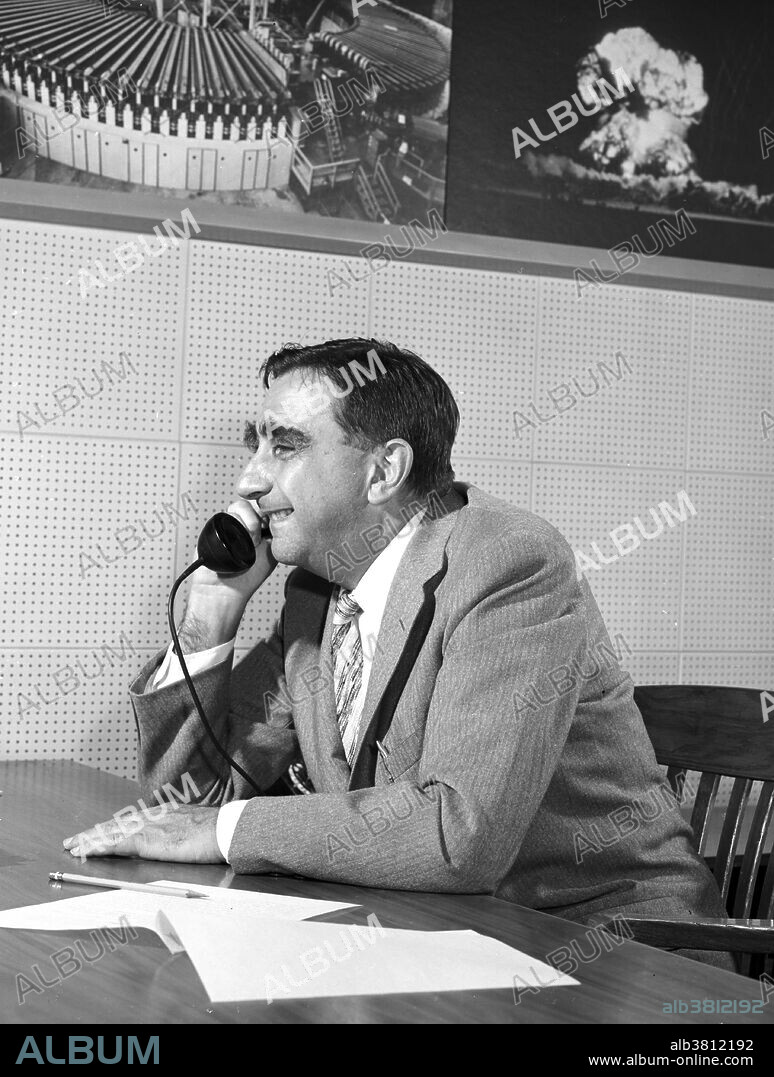alb3812192
Edward Teller, Hungarian-American Physicist

|
Add to another lightbox |
|
Add to another lightbox |



Buy this image.
Select the use:

Title:
Edward Teller, Hungarian-American Physicist
Caption:
Teller at desk talking on telephone, 1958. Edward Teller (January 15, 1908 - September 9, 2003) was a Hungarian-born American theoretical physicist, known as "the father of the hydrogen bomb". He immigrated to the U.S. in the 1930s, and was an early member of the Manhattan Project charged with developing the first atomic bombs. During this time he made a serious push to develop the first fusion-based weapons as well, but these were deferred until after WWII. After his controversial testimony in the security clearance hearing of his former Los Alamos colleague J. Robert Oppenheimer, Teller was ostracized by much of the scientific community. He continued to find support from the U.S. government and military research establishment, particularly for his advocacy for nuclear energy development, a strong nuclear arsenal, and a vigorous nuclear testing program. He was a co-founder of Lawrence Livermore National Laboratory (LLNL), and was both its director and associate director for many years. He made numerous contributions to nuclear and molecular physics, spectroscopy and surface physics. Throughout his life, Teller was known both for his scientific ability and his difficult interpersonal relations and volatile personality. He died in 2003, at the age of 95.
Credit:
Album / LBNL/Science Source
Releases:
Model: No - Property: No
Rights questions?
Rights questions?
Image size:
3628 x 4800 px | 49.8 MB
Print size:
30.7 x 40.6 cm | 12.1 x 16.0 in (300 dpi)
Keywords:
1950S • 1958 • 20 XX TWENTIETH CENTURY • 20TH CENTURY • 20TH • AMERICAN • BERKELEY • BW • CASHIER • CELEBRITIES • CELEBRITY • CO-FOUNDER • CONTROVERSIAL • EDWARD TELLER • FAMOUS PEOPLE • FAMOUS • FATHER OF THE HYDROGEN BOMB • FIGURE • GUEST WORKER (FEMALE) • HISTORIC • HISTORICAL • HISTORY • HUNGARIAN-AMERICAN • HUNGARIAN-BORN • IMMIGRANT (MALE) = IMMIGRANTS • IMMIGRANT (MALE) • IMMIGRANT • IMMIGRANTS (MALE) • IMPORTANT • LAWRENCE LIVERMORE NATIONAL LABORATORY • LLNL • MALE • MAN • MANHATTAN PROJECT • MEN • MOLECULAR PHYSICIST • MOLECULAR PHYSICS • NOTABLE • NUCLEAR ARSENAL • NUCLEAR ENERGY • NUCLEAR PHYSICIST • NUCLEAR PHYSICS • NUCLEAR POWER • PEOPLE • PERSON • PERSONALITIES • PERSONALITY • PHOTO • PHOTOGRAPH • PHYSICIST • PHYSICS • RADIATION LABORATORY • RESEARCH • SAVANT • SCIENCE • SCIENTIFIC • SCIENTIST • TELLER • THEORETICAL PHYSICIST • THEORETICAL PHYSICS • TWENTIETH CENTURY • UNITED STATES • US • USA • WELL-KNOWN
 Pinterest
Pinterest Twitter
Twitter Facebook
Facebook Copy link
Copy link Email
Email
